What to See in Bilbao: 9 Best Spots to Put in Your Itinerary

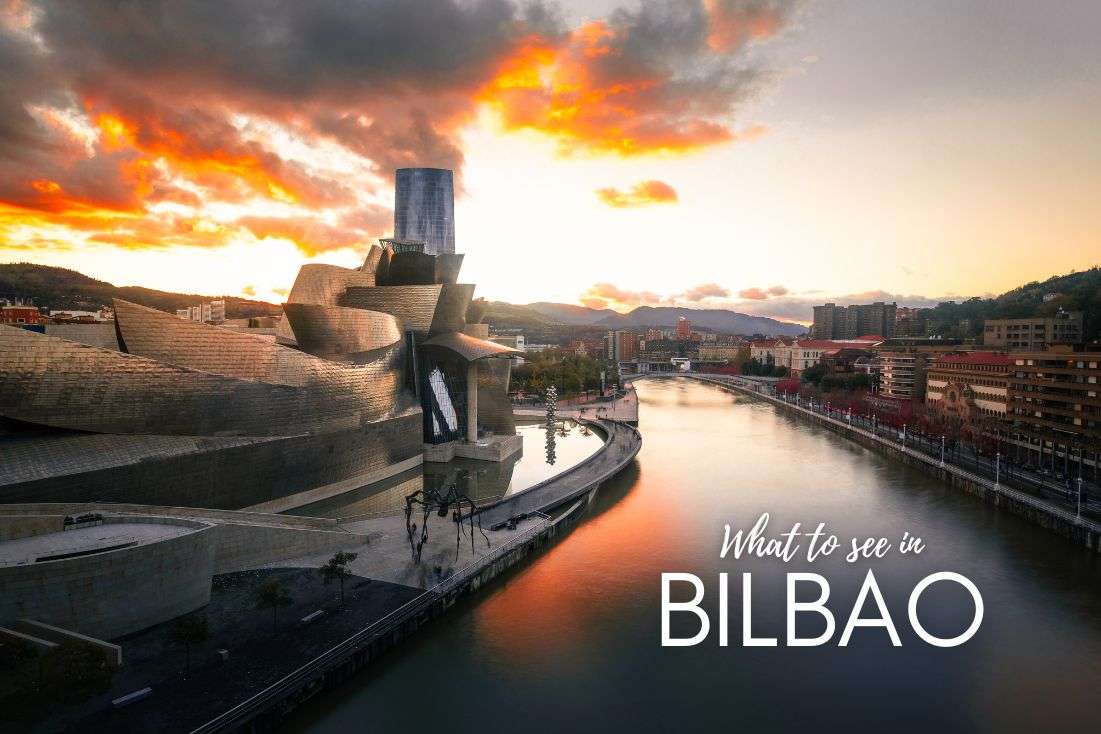
Like a stranger in its own country, Bilbao is so uniquely Basque and with a language that is impossible to decipher. It’s a cool little city that only became famous among tourists after the Guggenheim Museum was built in 1997. You know the feeling when you meet someone and you feel an instant connection for no obvious reason? Bilbao is that someone.
Bilbao has made it in the tourist industry thanks to its awesome-looking museum, perhaps with a little assistance from the huge flowery pup. Other than that, it’s just nice to be there, but there isn’t that much more in terms of attractions. I’d say give it two full days and you can be happily done and on your way.
I’ve made a list of 9 things to see and do in (and around) Bilbao that will easily fill up those two days. This is not a list of every church and old building in the city. I only include sights and stops that I think are actually worth your while.
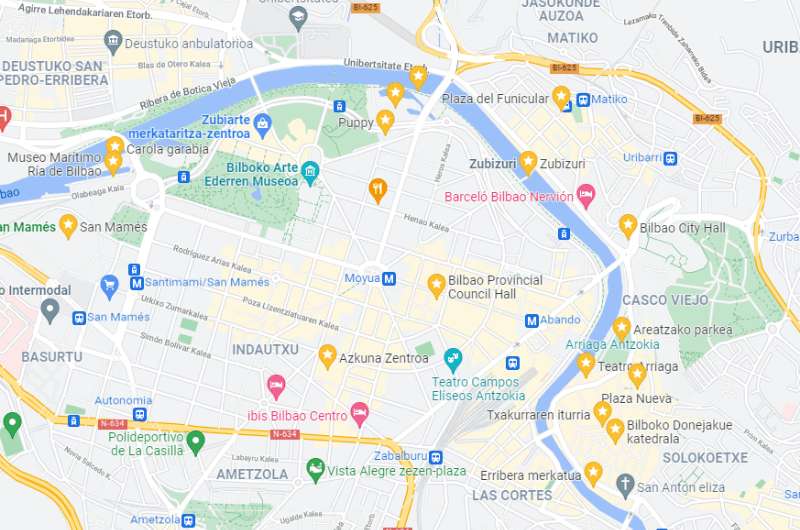
I’ve starred the top places to see in Bilbao from my list. The Old Town is to the right of the river.
Before visiting, take note of Bilbao’s weather – there’s an almost 50% chance of rain during the spring and winter months. September and October are arguably the sweet spot with less tourists but still mostly sunny and warm days. If you don’t mind the crowds, you don’t need to worry about the summer heat that much, since Bilbao’s temps rise above 30 °C (86 °F) for only about 15 days each year. Compare that to Sevilla in the south where the summer heat is so out of control that they are starting to name their heat waves.
You might also be interested in reading:
- Andalusia Itinerary: Southern Spain in 10 Days
- Barcelona Itinerary: 5 days in Gaudí’s Metropole (with day trips)
- All You Need to Know about Spanish Tapas (+Restaurant Tips)
- The 10 Best Museums in Spain’s Top Cities
- The 16 Most Beautiful Beaches in Spain
1. Vizcaya bridge
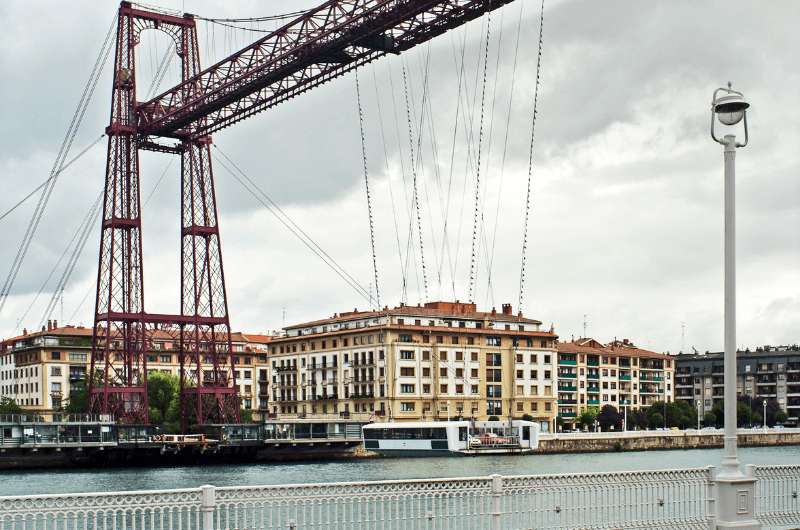
Can you see the hanging white gondola making its way across the river? Vizcaya bridge near Bilbao
First, let’s start a little out of town with Spain’s only industrial UNESCO Heritage Site. Vizcaya Bridge is called Bizkaiko Zubia in Basque, Puente de Vizcaya in Spanish and is locally known simply as Puente Colgante (=Hanging Bridge).
Bilbao is a port city, but it’s not right at the sea. In the 19th century, Bilbao was Spain’s biggest port and had a lot of cargo ships coming in and out through the estuary between Getxo and Portugalete. Bilbao’s port was some 10 km (6 miles) inland down the river.
Building a bridge that would connect the two river banks but would still allow ships heading to Bilbao to fit under was an engineering doozy. Enter Alberto Palacio, a student of none other than Gustave Eiffel. Palacio designed a bridge using iron from the local Vizcaya mines and then-new steel cable technology to create a high structure somewhat resembling a suspension bridge.
Tip: Like bridges? Ronda, a small cliff-top town in Andalusia, has a pretty cool bridge straddling the gorge the town is split by.
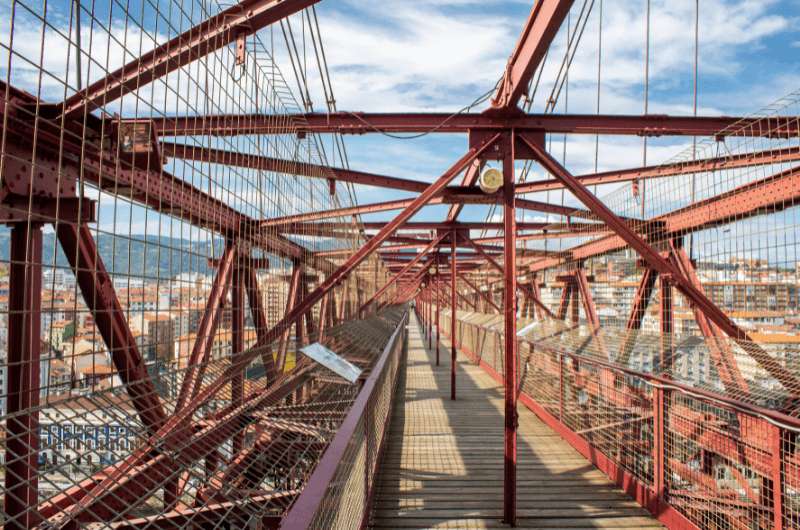
Walking atop the Vizcaya Bridge. Pretty cool!
But instead of traffic going over the bridge as you’d expect, Palacio hung a gondola from the bridge structure. The gondola is basically a ferry that glides back and forth over the river like a floating shuttle. The bridge was finished in 1893 and is the oldest transporter bridge in the world. There are currently only about 10 similar bridges in the world.
Nowadays, the gondola can carry 6 cars and dozens of pedestrians. It takes 1.5 minutes to go across the river. There is also an elevator that will take you up to the top of the bridge so you can walk across and take in the views of the bay and Bilbao’s modern port, which now is in the actual estuary before the bridge.
- For the elevator to the walkway: open daily 10 am–2 pm and 4 pm–8 pm. Price: €9.
- For the gondola: operates 24 hours a day, every 8 minutes during the day and every hour during the night. Price is €0.45 per person or €1.60 per car.
- Tickets can be purchased on either side of the bridge in the towns of Getxo and Portugalete.
2. Itsas Maritime Museum
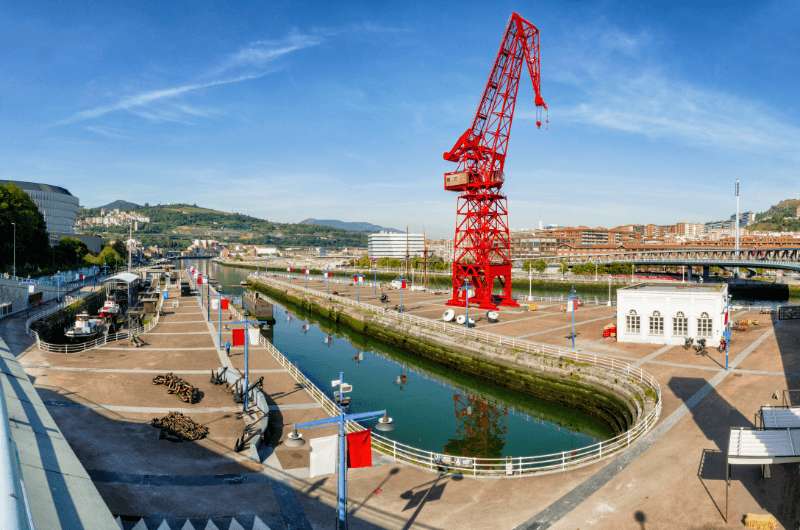
There she is! Carola the Crane
Given Bilbao’s maritime importance, we thought we’d educate ourselves a little on the subject.
Located in an old shipyard, the museum is interesting not only for boat nerds. The displays are interactive and well-designed, and are fun to look at even if you don’t want to read all the details. There are ship models and replicas inside and out. It’s not a stuffy old place full of boat pieces.
Outside, you can walk around the renovated area that used to be a shipyard with statues and humongous chains at random. There is also the pump house that was used to drain the docks, and a second, smaller exhibition building focused on wooden boats. Several smaller vessels are docked outside as well.
You can’t miss the red crane named “Carola” after a beautiful lady that used to pass through on her way to work every day. It was built in 1957 and was the strongest crane in its day.
- Itsas Museum, Muelle Ramón de la Sota 1
- Open Tuesday to Sunday 11 am–7 pm
- Tickets start at €4 per adult if you have kids with you, €6 is the general fare. Tuesdays are free outside of summer months.
3. San Mamés Stadium
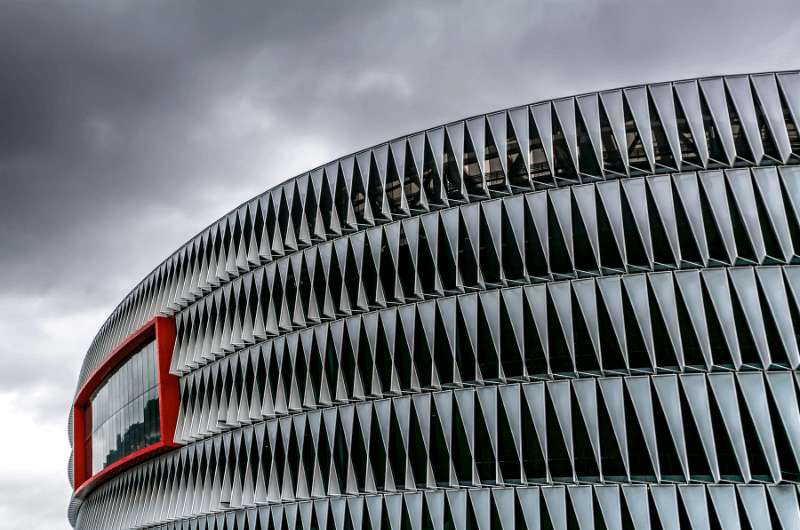
A detail of San Mames’ exterior
Replacing the old Sam Mamés that was first nicknamed “The Cathedral” due to its importance in the soccer world, the new stadium is now one of Bilbao’s architectural highlights. It even won in the sports category at the 2015 World Architecture Festival.
With over 50,000 seats and the highest level of facilities, it is much larger than the original 7,000 seat stadium. It has a sophisticated light and sound system, including hundreds of panels on the façade that can light up for a pretty awesome light show (it even changes color when a goal is scored!).
After an emotional goodbye in 2013, the old stadium was demolished. The new Mamés has inherited the nickname of its predecessor.
The new Cathedral is home to Athletics Bilbao, one of Spain’s most successful soccer clubs. It is one of only three clubs, along with Real Madrid and Barcelona, to never have been booted from the first division. Interestingly, the club only signs with players that were born or have trained in Basque Country.
You can take a guided tour of the stadium (45 minutes) or see the Athletic Club museum if you are so inclined. For us, walking around looking at the exterior was enough. Stroll by in the evening to see it lit up.
- San Mames Stadium, Rafael Moreno Pitxitxi
- Tickets for the stadium tour are €8. Tickets to the Athletic Museum cost €5 and include an audio guide.
4. Azkuna Zentroa Cultural Center
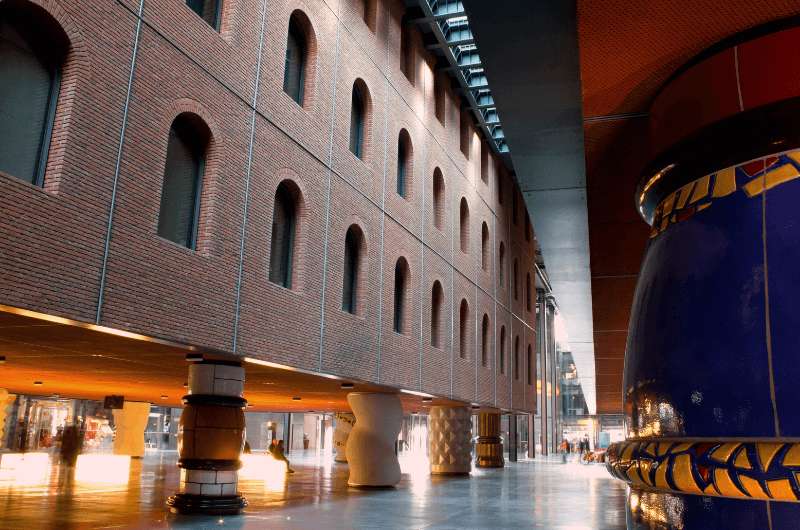
Some of the columns in Azkuna Zentroa with just a peek of the swimming pool through the ceiling
The cultural center is in what used to be an old wine, oil and pickle warehouse. The building is huge and arguably the best part, even though there is always an event, exhibition, concert or conference happening. Wandering around the public spaces with various art installations is all you need to get a feel for it, though. No really, check it out!
Our top tips for Bilbao:
- Undisputed top highlight: Guggenheim Museum
- Get a good view: Mount Artxanda
The exterior is kept original, so you need to walk inside to see what they’ve done with the place. If you walk around the atrium, there are about 40 stubby, weird columns that make the place quite impressive. Each one is different, an art piece in itself. Don’t forget to look up and see people swimming in the swimming pool above through its glass bottom! You can also browse the design store, visit a movie theater and enjoy a couple of nicely designed restaurants.
Then head up to the terrace for a wander and a view. Yandiola Restaurant serves good cocktails there as well.
- Arriquíbar Plaza 4
- Open daily 9 am–9 pm
- Free entry
5. Old Town Bilbao
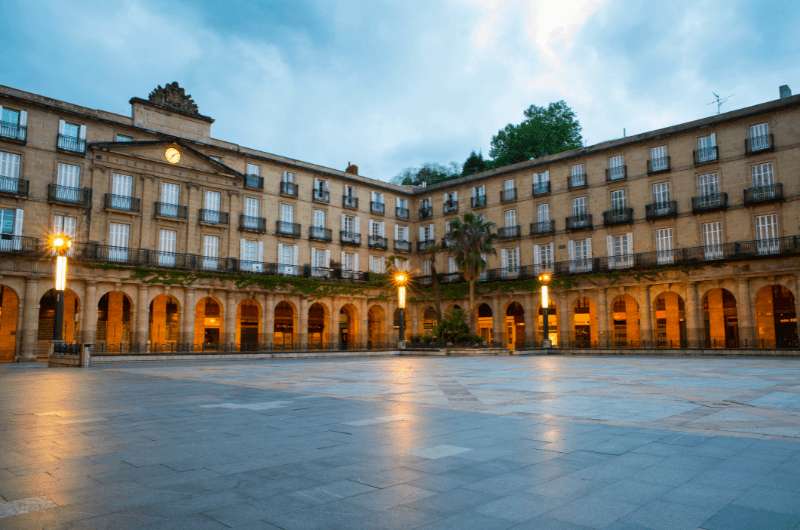
The Plaza Nueva during that one minute when nobody is there
The Old Town, or Casco Viejo, is affectionately called “Las Siete Calles” or “seven streets” based on the original streets that made up the city. This is where the port was and where it all started. Looking at a map of Bilbao, it is somewhat strangely off to the side of the city, even across the river from what is now modern central Bilbao.
As you do in most Old Towns, the main activity is to wander, stop for a coffee, and wander some more.
You could start your wander at Arenal Gardens by the river. This large open space with many trees, walkways and fountains is where you’ll find the flower market or book fairs on the weekends, as well as a bandstand where the city band plays music most Sunday mornings (not in the winter). It’s the place where you start your leisurely day. At the southern end of the park, walk past the nicely decorated Arriaga Theatre.
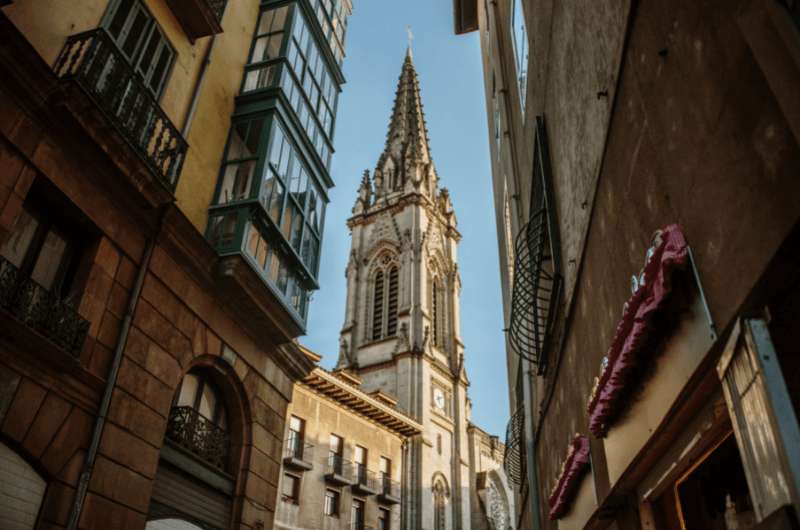
Walking through the streets of Old Town Bilbao
Continue to the Plaza Nueva which is a large square lined by old buildings and a million restaurants. Walk under the arches or stop in for some pintxos (not tapas! No no no, this is Basque country, no tapas here). They make fantastic ones at the contemporary Gure Toki restaurant. Sit in the stylish interior or stay on the terrace and people watch.
On your way through the little streets towards the Santiago Cathedral, stop for a 5-second look at the Fountain of Dogs. It’s a fountain (attached to the side of a building) from the early 1800s with three dogs spouting out water. It was originally used to wash animals to be sold on the nearby market. Now, it’s just a water fountain, though I guess you could give your parrot a shower if you really wanted. Also, they aren’t dogs at all, they’re Egyptian-looking lions!
Then, take a peek in the Catedral de Santiago de Bilbao. They have an entrance fee of something like €5.
Tip: A wonderful place to stay in the Old Town, with its very own Michelin restaurant on site, is Hotel Tayko. And I love the design of NYX by Leonardo Hotels.
6. La Ribera Market
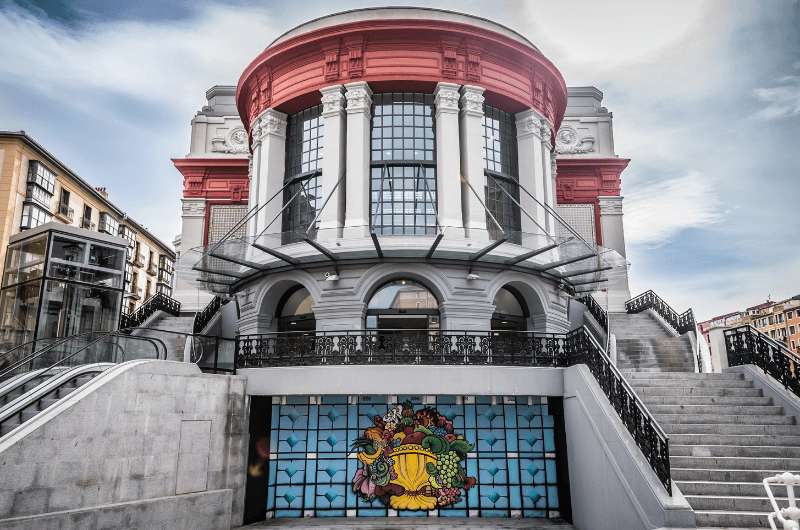
The façade of the La Ribera Market
Welcome to the largest covered food market in Europe! The art deco building sits right by the river on the southern end of Old Town.
Markets are usually a window into the soul of a city and this one is no different. The produce on sale is almost entirely local. Get there in the early morning if you want the best variety without the huge crowds. If you’re coming for the restaurants, head in in the afternoon.
Aside from produce stands (which include meat and fish), there are also maybe a dozen restaurants and pintxos bars on site with a large selection of Basque food and, well, pintxos! Again, that’s tapas in other parts of Spain (read up on everything Spain-related here).
Head up to the second floor to admire the stained-glass windows and some more shopping.
- Erribera Kalea, s/n
- Open Monday 8 am–2:30 pm, Tuesday to Friday 8 am–2:30 pm and 5 pm–8pm. Closed Sundays.
7. Mount Artxanda
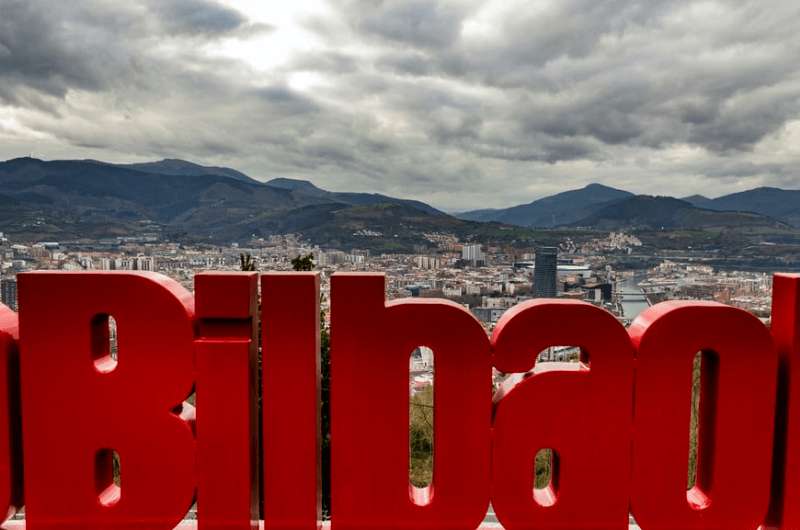
The sign up on Artxanda Mountain
What better way to get a look at the city than from a mountain sitting so conveniently next to it! Ride up comfortably in a little red and white cable car and enjoy the views.
Sitting just up north of the center, Mount Artxanda gives you a great view over not only the buildings of Bilbao, including the Guggenheim, but also shows you the many bridges of the meandering river. While you can take a walk up there and admire a blooming garden (depending on when you visit) and some fountains, you will probably just spend most of the time staring out over the large red “BilbaoBilbaoBilbao…” sign that serves as a railing. Take a pic at the huge fingerprint sculpture and you can head back down again.
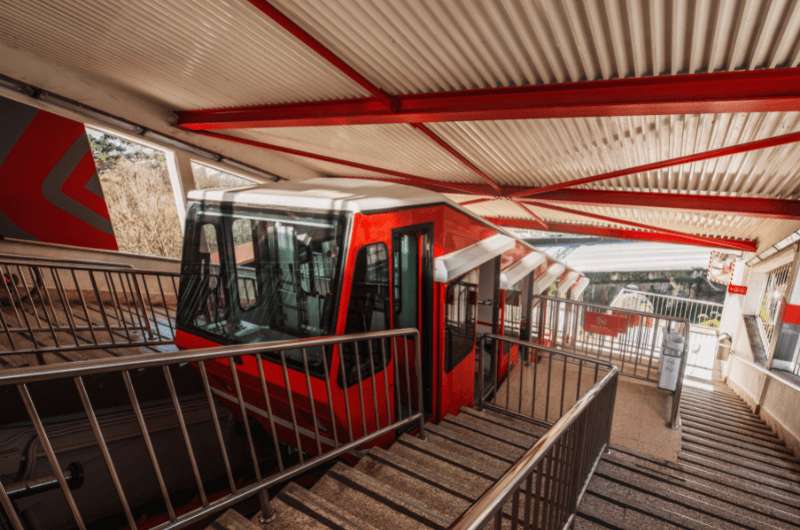
All aboard the Mount Artxanda cable car!
To reach the cable car station, cross over either the Zubizuri or Salbeko Zubia (bridges) from the new town (close to the Guggenheim). It’s only about 650 feet (200 m) from either of these bridges to the small Funicular Square (Funikularreko Plaza in Basque or Plaza del Funicular in Spanish).
The cable car goes every 15 minutes, and for some people, that will be all the time that is needed on Mount Artxanda. I’d say skip one cable car and then head down. It’s still worth it, because the view is really nice. Or, if you’re feeling energized, walk down!
- Funikularreko Plaza
- Cable car goes Monday to Saturday 7:15 am–10 pm, Sunday 8:15 am–10 pm. In June to September the service ends at 11 pm.
- Tickets cost €2.50 one way, €4.30 round trip
8. Zubizuri bridge
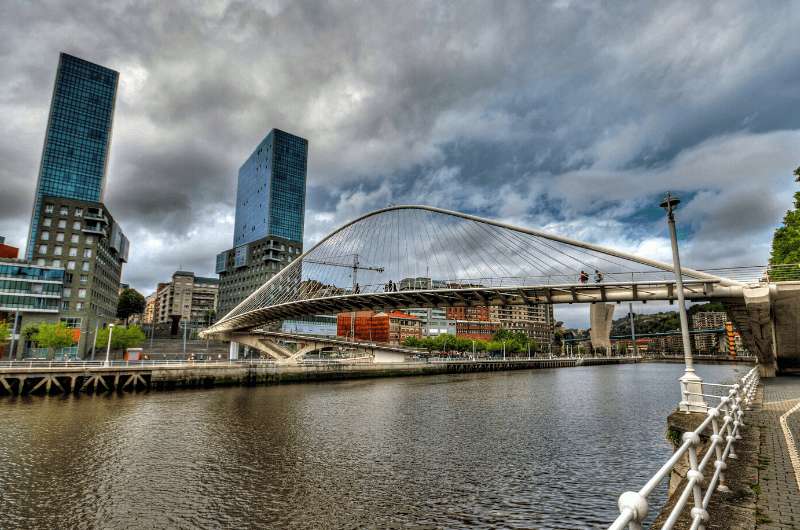
The Zubizuri
Since we already mentioned the Zubizuri bridge, it is also worth noting that it is worth seeing up close. In Basque, Zubizuri means “white bridge”, and it is, indeed, white. But more interestingly, it is curved! Another point in the Bilbao architecture book.
Just like the Guggenheim Museum, Zubizuri came to life in 1997, adding to the efforts of revitalizing the riverbank. It is an unusual footbridge suspended by steel cables and includes translucent bricks on the walkway.
Nothing more to say about the bridge, just that it’s pretty cool.
9. Guggenheim Museum
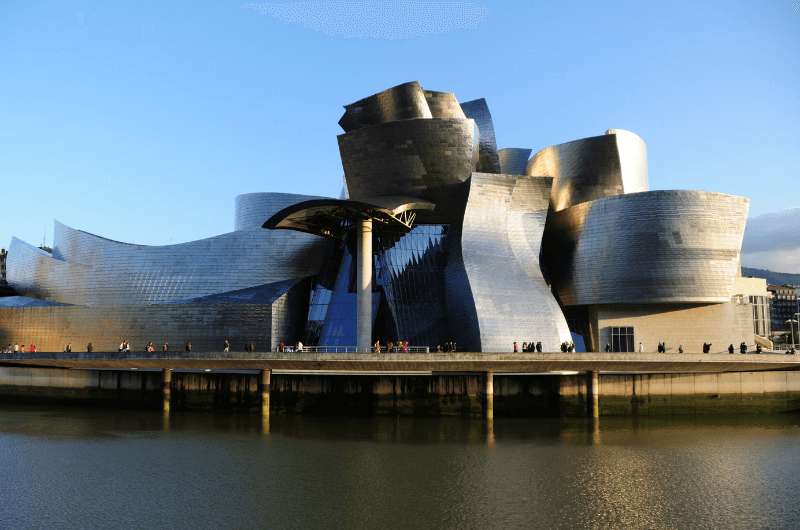
The out of this world Guggenheim Museum. What do you think the shape looks like?
And finally, Bilbao’s most famous landmark, the Guggenheim Museum. It houses modern and contemporary art, but even if you aren’t a huge art fan, the building itself is a masterpiece worth looking at both inside and out. A round of applause for the architect, Frank Gehry, everybody!
The fantastic titanium and glass exterior’s shape is up to interpretation. It can look like anything from an alien spaceship or an actual ship to a shoe with a mouth, depending on your imagination and where you are standing while looking at it.
Tip: You can contemplate your decision on the shape of the Guggenheim from some of the luckier hotels with views of the museum, like Hotel Miró or Vincci Consulado de Bilbao.
The museum is built around an atrium in the middle that is connected to the three floors by curved walkways and glass elevators.
The art inside… it’s modern art. You’ll either love it or hate it. How do huge sheets of metal sound to you? Nice? Interesting? Like garbage? How about huge colorful tulips? You get the picture. A lot of things are huge here. Art is in the eye of the beholder, after all.
Another huge thing? A 12.5 meter (40 foot) tall puppy! Outside the museum near the entrance, you’ll be treated to a big dog statue covered in thousands of flowers, simply called “Puppy” by Jeff Koons. I mean it’s cute, but is it art?
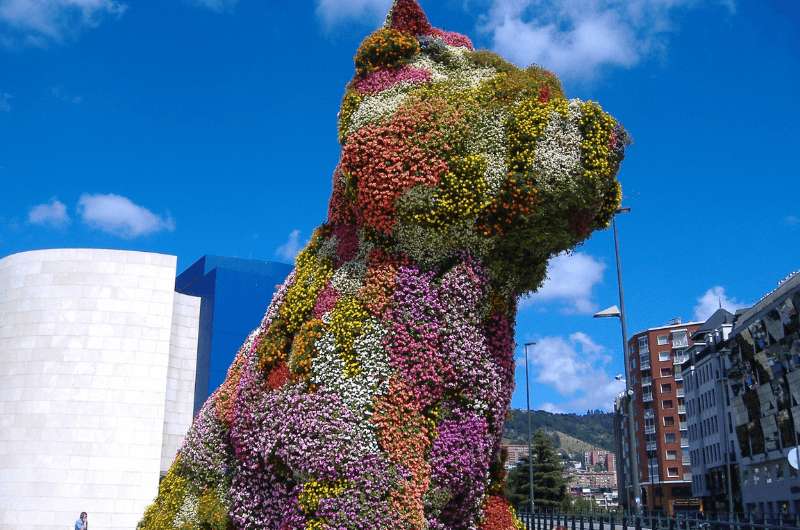
For a 25 year-old dog, he doesn’t look half bad! “Puppy” at the Guggenheim Museum
Another critter stands on the river-facing side of the museum. A large and pretty terrifying spider! His name is “Maman” and he was created by Louise Bourgeois. His name made me chuckle. In Czech, “maman” is a mama’s boy. I’ll ask my mom what she would think about cuddling this little guy.
Intended as a symbol of maternity, this spidey is a tribute to the artist’s mother, apparently showing both strength and fragility.
A visit to the Guggenheim will take you anywhere from two to four hours. Only you know how much of an art fan you are. If all else fails and whoever you are there with is taking too long, there is a decent café on site that you can kill some time at.
- Guggenheim Museum, Abandoibarra Etorbidea 2
- Open Tuesday to Sunday 11 am–7 pm. Mondays are closed unless visiting in July and August.
- Tickets cost €13
For a city with not much to see, there’s a lot to see, right?! So go ahead, book yourself a good hotel and start looking forward to your stay. You’ll thank me later.
This post may contain affiliate links. We earn a small commission if you make bookings through my links, at no additional cost to you. This helps us keep this blog free, thank you!


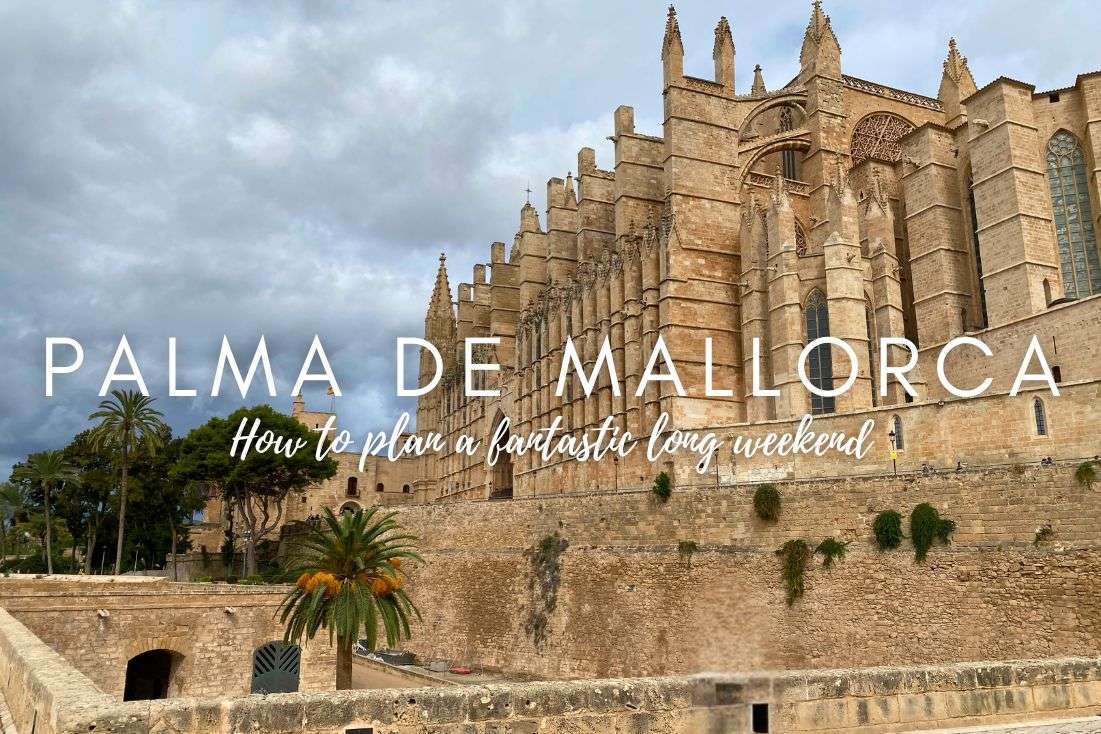
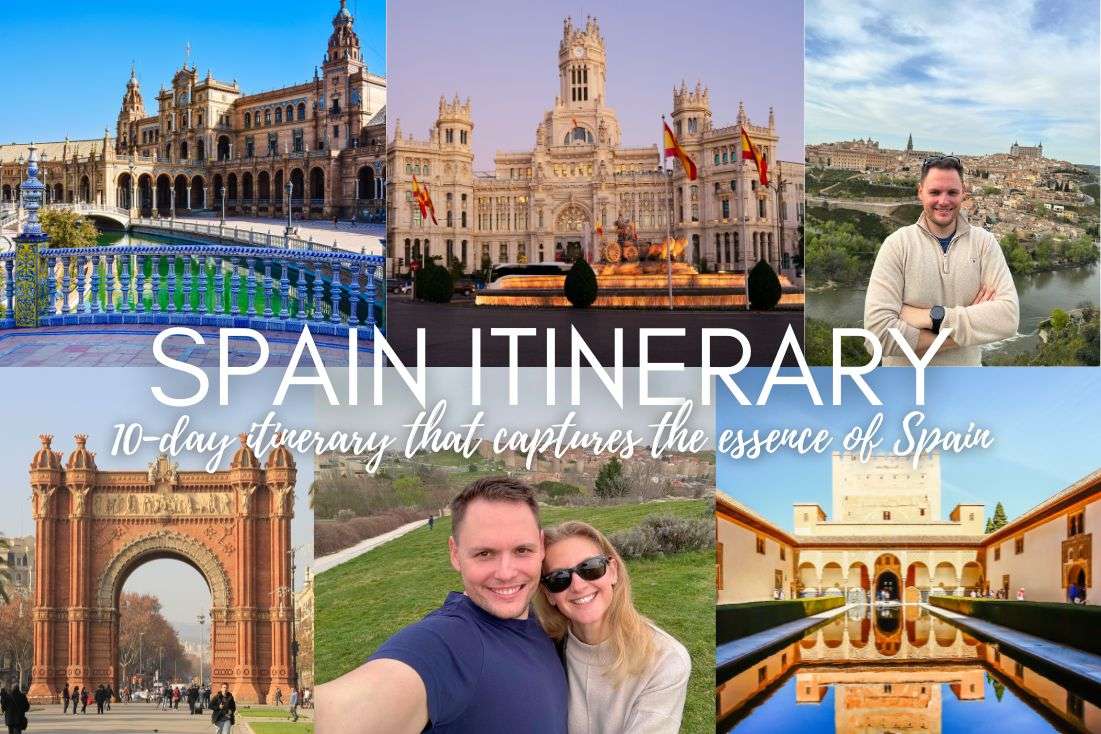
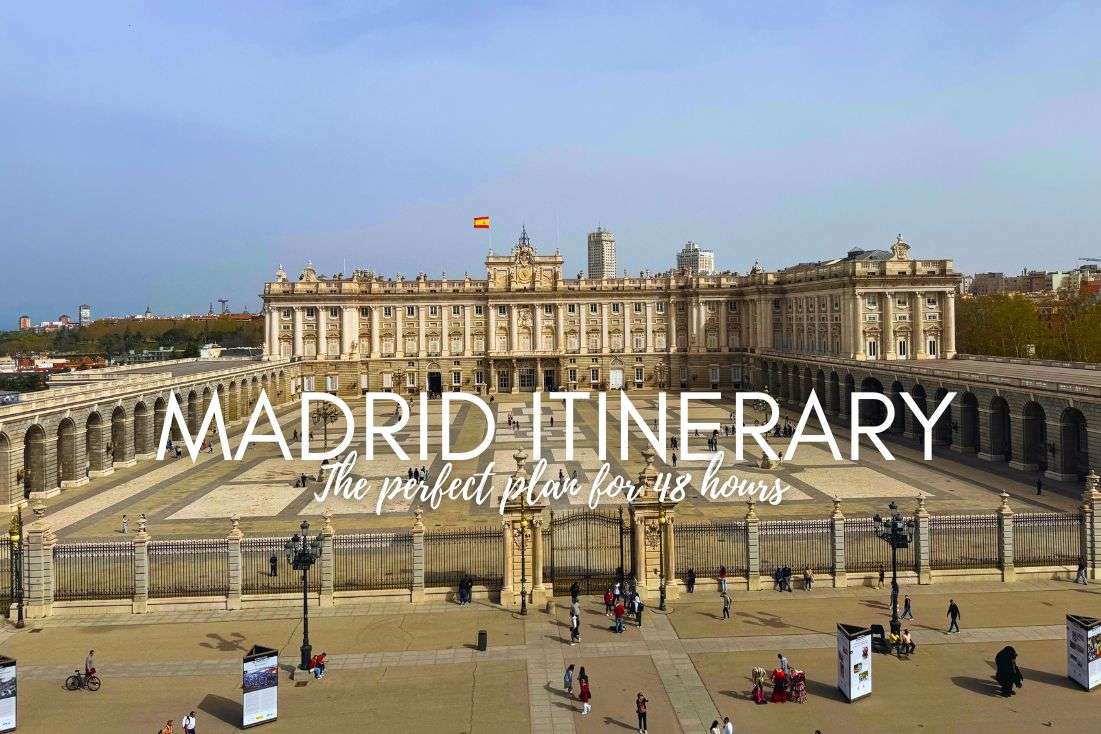





Comments | Thoughts? Give us a shout!